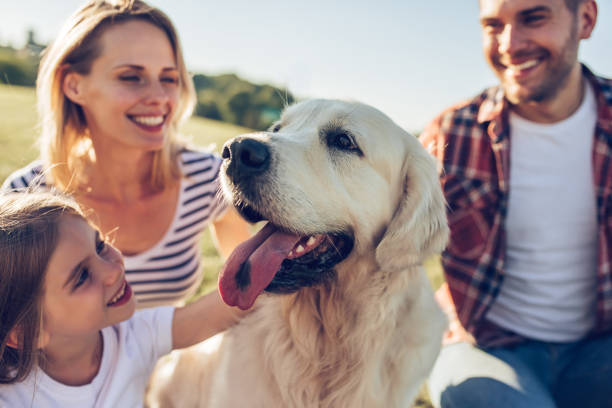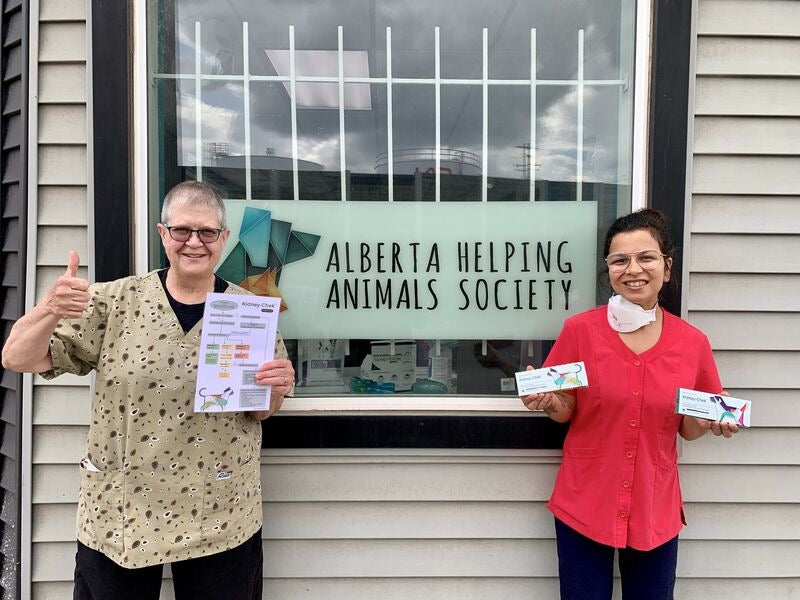
The animal care community is vast and is made up of many different pieces to operate smoothly. These include;
- animal shelters & rescues,
- pet food banks,
- spay and neuter clinics,
- community-run vet clinics,
- and of course, pet guardians.
Animal adoption rates have gone up quite a bit recently. According to Forbes Advisor, a total of 6.3 million animals enter animal shelters each year in the US, but only ~4 million are adopted.
Animal shelters and rescues are organizations that take care of animals who do not have a home yet. They work hard on a limited budget to make sure that animals are sheltered in a safe and healthy environment, and eventually find a forever home. We wanted to highlight a local, Edmonton-based, pet clinic to learn about their daily operations and how to make a real impact within the pet care community.
Alberta Helping Animals Society - Grassroots Outreach
We spoke to Connie Varnhagen, a registered veterinary technician (RVT) and professor of psychology and academic director of research at the University of Alberta. She is also the founder and president of the Alberta Helping Animals Society (AHAS) in Edmonton, Alberta. AHAS aims to help pets and their pet parents through physical and emotional trauma.
AHAS is supported by their incredible community, made of volunteers who want to help simply after hearing about the organization via word of mouth– and the word gets around. In addition to being supported by larger organizations like Alberta Veterinary Medical Association, some of their clients have a network who have become involved with AHAS to help their loved ones through their recovery programs:
“We have people coming in saying ‘I live in the same house as this person, want me to pick up their meds? Or help you with some volunteer work?’”
Getting involved in events in the local community is a sustainable and organic way to help make a difference, Connie and her team at AHAS see this every day:
“If we can get people [through community outreach] who are vulnerable, their children through high school, maybe going on to post-secondary, that’s the best way out of poverty,” said Connie.

How Kidney-Chek is Helping Save Pets at Alberta Helping Animals Society (AHAS)
We have been lucky enough to work with organizations like AHAS to ensure pets get the care they need.
Kidney-Chek is especially helpful in financially constrained clinics, shelters, and rescues that cannot afford to run blood panels for every pet in their care. For cats and dogs who appear healthy, and are not at high risk of Kidney Disease, Kidney-Chek can provide a useful tool to screen the pets' kidney health.
"We were one of the first clinics to try Kidney-Chek on our pet-patients," Connie said. "We had a cat who was supposed to be [healthy], but got a high reading on her [Kidney-Chek] test, turns out that she was in stage 3 renal failure, I did not know that!" she said.
AHAS uses Kidney-Chek in multiple ways: "We use it as a monitoring tool for cats or dogs recovering from an acute kidney injury or to monitor kidney function for an animal with renal disease." Connie mentioned. "Frankly, all shelters should use kidney check before doing spays and neuters and major surgery, we use it a lot," she said.
How Pets Support Us Through Recovery
A lot of their clients are going through mental illness and addiction. The team at AHAS has found that companion animals help folks who want to get better. For a person with severe addiction or mental illness, recovery is easier with a support system:
“We have had people come in [saying that] they stay on their [recovery] program to make sure they get up for the cat in the morning,” Connie said.
There is so much power in the bonds we share with our pets!
Connie agreed, “We find that the bond between our clients and their pets is stronger than the average pet parent–though all pet parents have strong bonds with their animals.” She thinks the difference comes from the absence of an overall community available to vulnerable populations, “for most of these folks, their pet is the only support system they have,” she said. “Interacting with animals has been shown to increase oxytocin, the love hormone, decrease stress, and increase dopamine, which promotes positive reinforcement. These are fabulous ways to help people recover from trauma, whether it is psychological or physical trauma,” she stressed.
Bonds with companion animals also help with cognitive abilities and aging, “We have seen testimonials from families who have said that grandpa is in the end stages of dementia, he isn't talking, and you bring a dog in, and all of a sudden, grandpa is talking! To the dog! It may be a bit of a word salad, but there is a little communication going on there,” she said.
Ways to Show Up For Pets In Our Community
The rising costs of veterinary and animal care shouldn’t be the reason animal lovers can't become pet parents. Especially if it means that the animals can't find a forever home. At Kidney-Chek, we want to make it more quick and affordable for animal shelters to screen incoming animals, and help organizations like AHAS reach as many pet families as they can.
1. Donate
When we asked Connie what the wider animal-lover community can do to help their local animal shelters, rescues, and clinics, she said to donate as much as you can: “Pick up an extra bag of dog food the next time when you can, drop it off at an animal food drive… do it once a month, once a year! It makes a real difference!” she said.
2. Adopt
You can support local pet shelters in many ways, the biggest one being adopting a pet. Ensure you know the medical concerns, what kind of lifestyle they prefer, and are bred for.
For example, if you adopt an older German Shepherd, it is more likely that they will develop kidney disease. Make sure you keep an eye on their hydration and use preventative and affordable tools like Kidney-Chek to take early action and protect their kidneys from long-term damage.
3. Foster
If adoption is too big of a commitment, consider becoming a foster parent to an animal who may need some extra attention and help a shelter out. When looking for an animal shelter, make sure to visit the location and see how they treat their pets, if they have trained staff members, and have active engagement in the community.
How Can You Help?
From speaking with Connie, it is clear that small acts of service and kindness to those in the community who need it the most can have ripple effects. More often than not, you can reach more people (and furry friends) than you think!
If you work with or know of a rescue or shelter in your community that might benefit from learning more about Kidney-Chek, please share this blog with them or send us an email with their name and we would be happy to reach out!
–
Kidney damage is irreversible, so the best thing you can do for your pet is preventative screening! Check if your pet is at high risk for kidney disease here!
Stay up to date on Kidney Health for cats and dogs on our Blog, Instagram, and Facebook.
